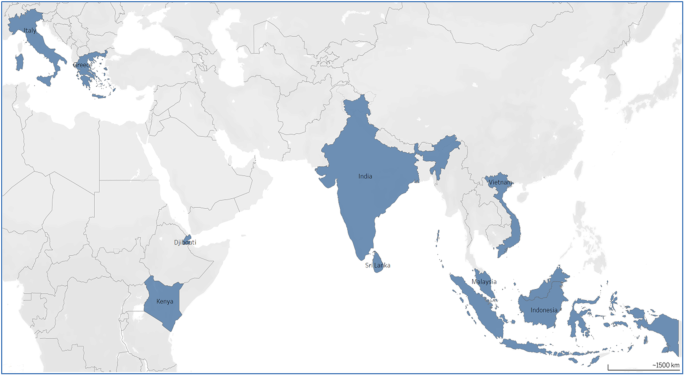Advancing Sustainable Logistics on the Maritime Silk Road: Integrating DEA and Risk via Prospect Theory




The study introduces an innovative approach to understanding sustainable logistics within the context of the 21st-Century Maritime Silk Road, a component of China's Belt and Road Initiative (BRI) that aims to revitalize ancient trade routes through enhanced maritime connectivity. This ambitious venture is designed to revitalize ancient trade routes across Asia, Europe, Africa, and extends to parts of South America, emphasizing sustainable logistics as a priority for participating countries.
The research evaluates the logistics potential of key countries along the Maritime Silk Road using a sophisticated DEA model, enhanced by elements of Prospect Theory. This approach uniquely combines quantitative efficiency metrics with qualitative insights into decision-making behaviors, providing a holistic view of each nation's capability in economic performance, energy efficiency, and governance quality. The initiative is essentially split into two parts: the Silk Road Economic Belt, focusing on overland infrastructure like railways and highways, and the Maritime Silk Road, dedicated to maritime routes enhancement.
The focus rests on developing port facilities and infrastructure to bolster sea-based trade and connectivity, aiming for efficient and secure maritime transport. The Maritime Silk Road is significant in reshaping global trade patterns, underscoring the importance of maritime routes in global supply chains, as well as economic growth in coastal areas. Eco-friendly transportation methods and practices that minimize ecological impact are crucial for the trade and development objectives along the MSR.
Beyond regional strengths, pivotal partners such as India, Greece, Djibouti, and Kenya illustrate varied strengths that collectively support the Maritime Silk Road's objectives. The study highlights Vietnam's impressive economic efficiency, showcasing its prowess in lean operational capabilities that bolster the Maritime Silk Road's logistical framework. Indonesia's remarkable achievements in sustainability offer a beacon of hope, shining a spotlight on the potential for eco-friendly maritime innovations and governance quality.
Malaysia emerges as a strategic checkpoint with balanced efficiency across various logistics indices, reflecting lucrative opportunities for investors eyeing high-potential areas in maritime trade. Greece comes to the fore with notable infrastructure and logistics efficiency, narrating a tale of steadfast governance and escalating innovation capabilities. Countries like India, Greece, Djibouti, and Kenya also emerge as vital partners, each possessing unique strengths that contribute significantly to the broader objectives of enhancing connectivity and sustainable trade practices.
This research is a pioneering integration of behavioral economic insights within logistics evaluations, addressing existing gaps and offering new dimensions to sustainability studies. The integration of a Data Envelopment Analysis (DEA) model alongside Prospect Theory provides a robust approach to evaluate the efficiency of various entities, considering input-output relationships, while Prospect Theory offers a nuanced perspective on decision-making under uncertainty and risk.
Prospect Theory, developed by Daniel Kahneman and Amos Tversky, delves into how individuals make decisions under uncertainty. This theory introduces concepts like loss aversion, where losses weigh more heavily than equivalent gains, and reference dependence, where decisions are influenced by a comparative starting point. In logistics, this means understanding how these psychological factors can influence strategic positioning and decision efficiency.
This methodology advances traditional logistics assessment methods, blending hard data analysis with behavioral insights. This dual approach is particularly suited to scrutinize sustainability in logistics operations, aiming to align MSR's strategic and sustainability objectives. The study introduces a risk-aware DEA model that integrates these behavioral factors, providing a comprehensive understanding of sustainable logistics practices.
The research vividly explores Vietnam's blazing trail in economic efficiency, while Indonesia's remarkable triumphs in sustainability offer insights into minimizing the ecological footprint along these nautical highways. Governance and decision-making are bolstered by the model's integration with Prospect Theory, creating a sophisticated framework for assessing logistics potential along the MSR.
The MSR tapestry is richly woven with contributions from multiple nations, each bringing a unique palette of strengths, driving forward an efficient, secure, and environmentally conscious maritime trade network. This pursuit of sustainability in logistics reflects a global trend towards responsible resource management and innovation, driven by international investment interests aligned with social and sustainability goals.
The study unveils key strategic insights for policymakers vested in fortifying their nation's logistics potential while aligning with eco-friendly practices. On the investment forefront, countries with balanced efficiency across various logistics indices reflect lucrative opportunities for investors eyeing high-potential areas in maritime trade. The research supports policymakers, investors, and business leaders with a fresh perspective on sustainable practices.
While the study acknowledges limitations, such as the indirect measurement of psychological coefficients and a focus primarily on efficiency metrics, it serves as a foundation for advancing research that includes qualitative aspects in logistics assessments. Policymakers and investors alike are encouraged to harness these insights to drive initiatives that prioritize innovation while embracing ecological mindfulness and resilient infrastructure development.
As global trade dynamics evolve, this comprehensive assessment serves as a compass for policymakers, businesses, and investors aiming to enhance sustainable trade practices that align with both economic objectives and environmental stewardship. The real benefit for stakeholders lies in the actionable insights this research offers: a deeper grasp of how logistics strategies can align with global sustainability trends and economic growth goals.

Comments